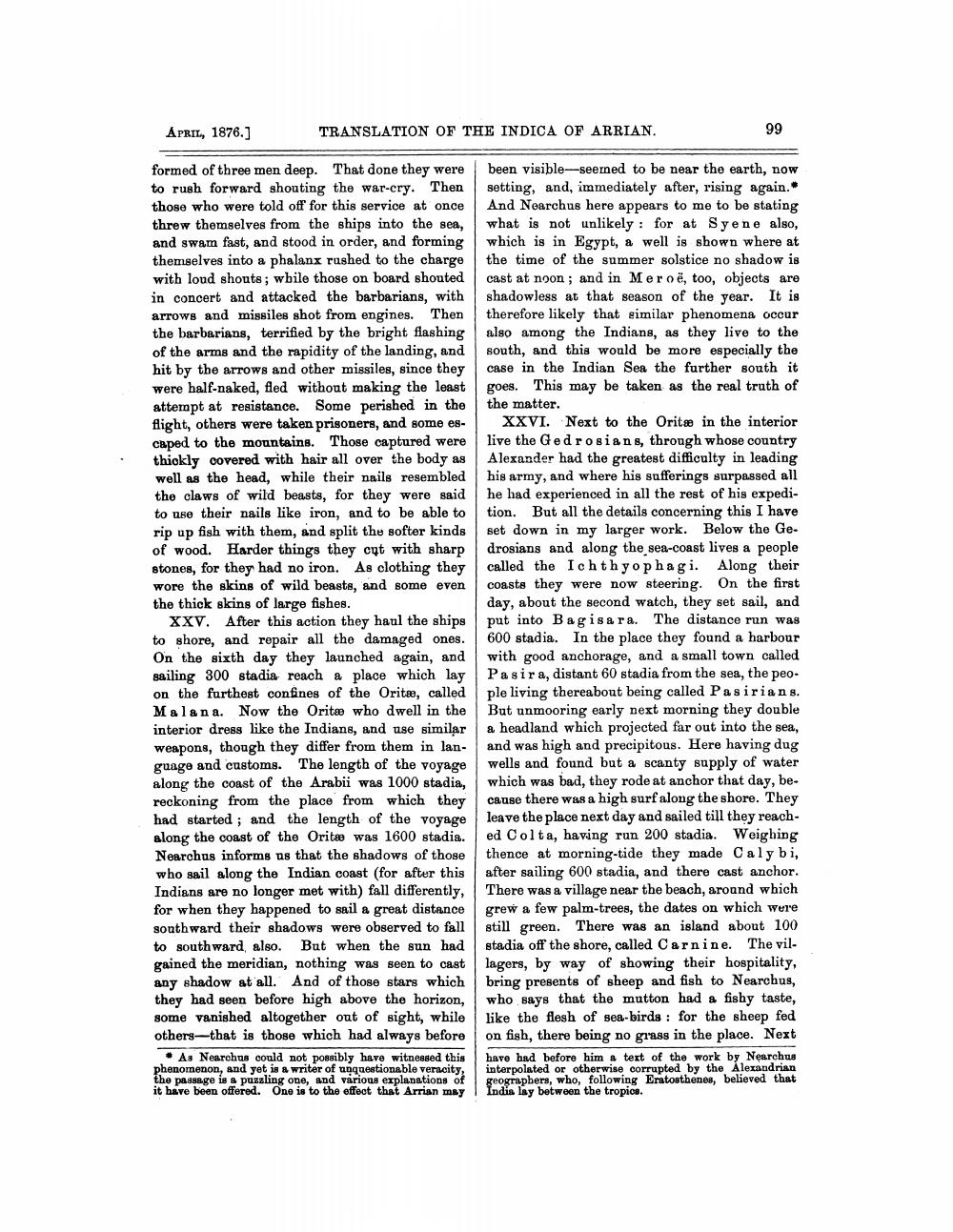________________
APRIL, 1876.]
TRANSLATION OF THE INDICA OF ARRIAN.
99
formed of three men deep. That done they were to rush forward shouting the war-cry. Then those who were told off for this service at once threw themselves from the ships into the sea, and swam fast, and stood in order, and forming themselves into a phalanx rushed to the charge with loud shouts; wbile those on board shouted in concert and attacked the barbarians, with arrows and missiles shot from engines. Then the barbarians, terrified by the bright flashing of the arms and the rapidity of the landing, and hit by the arrows and other missiles, since they were half-naked, fled without making the least attempt at resistance. Some perished in the flight, others were taken prisoners, and some escaped to the mountains. Those captured were thickly covered with hair all over the body as well as the head, while their nails resembled the claws of wild beasts, for they were said to use their nails like iron, and to be able to rip up fish with them, and split the softer kinds of wood. Harder things they cut with sharp stones, for they had no iron. As clothing they wore the skins of wild beasts, and some even the thick skins of large fishes.
XXV. After this action they haul the ships to shore, and repair all the damaged ones. On the sixth day they launched again, and sailing 300 stadia reach a place which lay on the furthest confines of the Orite, called Malana. Now the Oritæ who dwell in the interior dress like the Indians, and use similar weapons, though they differ from them in lan- guage and customs. The length of the voyage along the coast of the Arabii was 1000 stadia, reckoning from the place from which they had started ; and the length of the voyage along the coast of the Oritæ was 1600 stadia. Nearchus informs us that the shadows of those who sail along the Indian coast (for after this Indians are no longer met with) fall differently, for when they happened to sail a great distance southward their shadows were observed to fall to southward, also. But when the sun had gained the meridian, nothing was seen to cast any shadow at all. And of those stars which they had seen before high above the horizon, some vanished altogether out of sight, while others--that is those which had always before
• As Nearchus could not possibly have witnessed this phenomenon, and yet is a writer of unquestionable veracity, the passage is a pussling one, and various explanations of it have been offered. One is to the effect that Arrian may
been visible-seemed to be near the earth, now setting, and, immediately after, rising again. And Noarchus here appears to me to be stating what is not unlikely : for at Syene also, which is in Egypt, a well is shown where at the time of the summer solstice no shadow is cast at noon; and in Meroë, too, objects are shadowless at that season of the year. It is therefore likely that similar phenomena occur also among the Indians, as they live to the south, and this would be more especially the case in the Indian Sea the further south it goes. This may be taken as the real truth of the matter.
XXVI. Next to the Orite in the interior live the Gedrosians, through whose country Alexander had the greatest difficulty in leading his army, and where his sufferings surpassed all he had experienced in all the rest of his expedition. But all the details concerning this I have set down in my larger work. Below the Gedrosians and along the sea-coast lives a people called the Ichthyophagi. Along their coasts they were now steering. On the first day, about the second watch, they set sail, and put into Bagisa ra. The distance run was 600 stadia. In the place they found a harbour with good anchorage, and a small town called Pasira, distant 60 stadia from the sea, the peo. ple living thereabout being called Pasirians. But unmooring early next morning they double a headland which projected far out into the sea, and was high and precipitous. Here having dug wells and found but a scanty supply of water which was bad, they rode at anchor that day, because there was a high surf along the shore. They leave the place next day and sailed till they reached Colta, having run 200 stadia. Weighing thence at morning-tide they made Calybi, after sailing 600 stadia, and there cast anchor. There was a village near the beach, around which grew a few palm-trees, the dates on which were still green. There was an island about 100 stadia off the shore, called Carnine. The vil. lagers, by way of showing their hospitality, bring presents of sheep and fish to Nearchus, who says that the mutton had a fishy taste, like the flesh of sea-birds : for the sheep fed on fish, there being no grass in the place. Next have had before him a text of the work by Nearchus interpolated or otherwise corrupted by the Alexandrian geographers, who, following Eratosthenes, believed that India lay between the tropioo.




